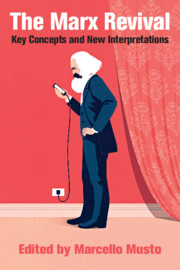Book contents
- The Marx Revival
- The Marx Revival
- Copyright page
- Contents
- About the Editor
- Contributors
- Preface
- Acknowledgements
- Note on the Text
- 1 Capitalism
- 2 Communism
- 3 Democracy
- 4 Proletariat
- 5 Class Struggle
- 6 Political Organization
- 7 Revolution
- 8 Work
- 9 Capital and Temporality
- 10 Ecology
- 11 Gender Equality
- 12 Nationalism and Ethnicity
- 13 Migration
- 14 Colonialism
- 15 State
- 16 Globalization
- 17 War and International Relations
- 18 Religion
- 19 Education
- 20 Art
- 21 Technology and Science
- 22 Marxisms
- Index
- References
12 - Nationalism and Ethnicity
Published online by Cambridge University Press: 29 May 2020
- The Marx Revival
- The Marx Revival
- Copyright page
- Contents
- About the Editor
- Contributors
- Preface
- Acknowledgements
- Note on the Text
- 1 Capitalism
- 2 Communism
- 3 Democracy
- 4 Proletariat
- 5 Class Struggle
- 6 Political Organization
- 7 Revolution
- 8 Work
- 9 Capital and Temporality
- 10 Ecology
- 11 Gender Equality
- 12 Nationalism and Ethnicity
- 13 Migration
- 14 Colonialism
- 15 State
- 16 Globalization
- 17 War and International Relations
- 18 Religion
- 19 Education
- 20 Art
- 21 Technology and Science
- 22 Marxisms
- Index
- References
Summary
The legend that Karl Marx either said almost nothing on nationalism, race, and ethnicity, or that on these issues he was woefully mistaken and reductionist, has been maintained in axiomatic fashion for decades, despite numerous scholarly refutations. Of course, not everything Marx wrote on nationalism, ethnicity, and race holds up well today. One prominent example concerned the Russians and some of the other Slavic peoples of Eastern and Southern Europe. As will be discussed, Marx strongly supported Polish national emancipation as an important progressive force in European politics. But, in his early writings, he portrayed Russia as an utterly reactionary society, and described most of the other Slavic peoples as dominated by Russian Pan-Slavist propaganda. This has led to extended – and sometimes unfair – attacks on Marx on nationalism tout court. To a great extent, Marx’s views were connected to Russia’s counter-revolutionary role during the democratic revolutionary wave of 1848–9, but this is not a full explanation. For one can find in Marx’s writings on Russia before the 1870s not only violent denunciations of the Tsarist Empire as a malevolent force, but also a number of very problematic, even racist statements about the Russian people themselves. As to other Slavic groups, most of the vitriol was expressed by Friedrich Engels (1820–95) in a series of articles on Pan-Slavism.2 Both Marx and Engels shifted their positions by the 1870s and the 1880s, however, when one can find Marx – who had learned Russian by this time – extolling the Russian peasant commune as a possible starting point for a global insurrection against the capitalist system.3
- Type
- Chapter
- Information
- The Marx RevivalKey Concepts and New Critical Interpretations, pp. 212 - 231Publisher: Cambridge University PressPrint publication year: 2020

